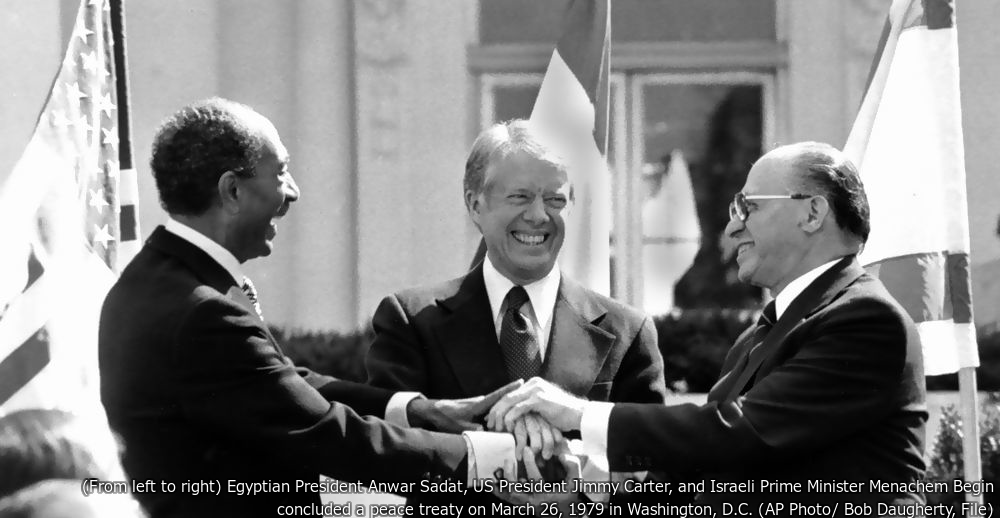Introduction
On September 15, 2020, a joint statement was issued in Washington concerning Israeli peace agreements with the United Arab Emirates (UAE) and Bahrain (The Abraham Accords Declaration). These agreements brought to four the number of Arab nations that have official diplomatic relations with Israel, the first two being Egypt (since 1979) and Jordan (since 1994)1. US President Trump himself praised these as "historic agreements"; however, there was no Palestinian representative at this celebration. These agreements mainly focus on strengthening economic and security relations among the participating countries, and they have encountered both supporting and opposing views within the international community. In particular, Iran and Turkey, which are at odds with Saudi Arabia and the UAE in the region, have strongly criticized the agreements, saying they run counter to resolving the Palestinian Question.
Many readers might recall the Camp David Accords of about 40 years ago that led to the first peace treaty between Israel and Egypt. Let us now compare the two peace efforts and consider what the meaning of the 'Arab Cause' has been.
"Abraham Accords" - US-Mediated Establishment of Diplomatic Relations between Israel and two Gulf Arab States
Prior to the September joint statement, the Israeli-UAE Abraham Accords Peace Agreement including the normalization of diplomatic relations had been concluded on August 15. The accords were named after Abraham (Ibrahīm in Arabic), revered by the three faiths of Judaism, Christianity, and Islam as a common patriarch. Later, Bahrain joined the accords. Since the founding of Israel in 1948, there have been four wars in the region. Unlike Egypt, Jordan and Syria, the UAE and Bahrain, while being Arab countries, have never fought directly with Israel2.
These accords made it possible for Israel and the two Gulf countries to fully normalize diplomatic relations, conduct economic and technical cooperation, coordinate in the fight against the corona pandemic, and operate direct flights. Saudi Arabia's Foreign Minister Prince Faisal bin Farhan al-Saud said that Saudi Arabia supports the establishment of a Palestinian state based on the borders in place before the Third Arab-Israeli War in 1967, and made no direct mention of the agreements. However, Saudi Arabia permitted direct Israeli-UAE flights over the country and allowed neighboring Bahrain to join the accords, which is believed to be in effect an endorsement of the agreements.
The real motive of the UAE is the purchase of sophisticated weapons, and it is reported that the UAE is planning to purchase F-35 stealth fighters from the United States by December. While the two Gulf Arab states look forward to obtaining advanced Israeli technology, including new means of surveillance, Israel anticipates strengthening its position in the region, developing economic relations with the Gulf Arab countries, and opening air routes to Asian countries. Whereas the issues of Israel's "West Bank annexation" and continued occupation, both of which have been criticized by the international community, were left unaddressed, an anti-Iran strategic alliance was formed.
Camp David Agreements: Egypt-First Rather Than the Palestinian Question
Egypt was the first Arab country to make peace with Israel about 40 years ago, prioritizing its own interests over those of the 'Arab Cause'. In September 1978, US President Jimmy Carter invited Egyptian President Muhammad Anwar el-Sadat and Israeli Prime Minister Menachem Begin to stay at Camp David in Maryland for two weeks. Six months later, in March 1979, a peace treaty was signed, and Egypt recovered the Sinai Peninsula, which had been occupied in the 1967 Third Arab-Israeli War. However, the withdrawal of Israeli forces from the Palestinian territories and their right to self-determination remained ignored. Sadat and Begin were awarded the Nobel Peace Prize, but Egypt was cut off from the rest of the Arab world and isolated.
The Camp David Accords brought about a major shift in Egypt's diplomacy and economy. During the Cold War, President Gamal Abdel Nasser, while advocating non-alignment between the United States and the Soviet Union, adopted in reality pro-Soviet, anti-American and anti-Israel positions. In the 1970s, however, the superpowers were shifting from confrontation to detente. Sadat, who succeeded Nasser, led Egypt to victory in a surprise attack at the beginning of the Fourth Arab-Israeli War in 1973 and paved the way for Camp David.
In an attempt to shift away from Arab socialism under Nasser, Sadat had been promoting "open door policies (infitāḥ)" such as partial liberalization of the economy and the introduction of foreign capital; the peace treaty let aid from the West flow in. The ban on Egyptians going to work in the Gulf oil-producing countries was lifted and the number of wealthy Egyptians increased. At the same time, however, domestic disparities increased; in January 1977, food riots broke across the country. Public distrust of Sadat increased as opposition crackdowns intensified, and Sadat was assassinated by Islamists in October 1981.
Consequences of the Camp David Agreements
What did Egypt gain or lose from the Camp David Accords in exchange for Sadat's death? On the positive side of the ledger were economic and military assistance from the West, including the United States, and economic cooperation with Israel, especially regarding natural gas and agriculture.
US foreign aid largely comprises external military financing and economic assistance. Most military aid (75% in 2015) has been allocated to Israel and Egypt. To date, US aid to Israel (1946-2017) has reached approximately US$134.8 billion, of which 70% is military assistance. Israel's advanced military and surveillance technologies are the result of years of US assistance.
Egypt is the second largest recipient of US aid after Israel. The total amount of disbursements (1946-2017) has reached approximately US$79.8 billion, 60% of which was military assistance. With some exceptions, annual military assistance has continued to exceed US$1.3 billion since 1980s. In addition to the procurement and maintenance of weapons from the United States, yearly long-term and short-term military exercises have been conducted, strengthening the military relationship between the United States and Egypt. Economic assistance, which accounts for about 40% of total US aid to Egypt, is provided mainly by the United States Agency for International Development (USAID), but also by the Department of Agriculture and the Trade and Development Agency (USTDA). Economic assistance activities cover a wide range of areas.
Egypt has certainly benefited from this economic and military aid, but it has also suffered losses: its isolation within Arab politics for betraying the "Arab Cause" aimed at resolving the Palestinian Question, the loss of national pride among Egyptians, and the loss of trust between the regime and its people. Resistance to and distrust of the Camp David Accords among the Egyptian people affected economic relations and tourism between the two countries and, more than 40 years after the peace treaty, people-to-people exchanges between Israel and Egypt remain overwhelmingly one-way. The number of Israeli tourists to Egypt's Red Sea resorts has increased, while tourism in the opposite direction is still slight.
Two Trends in Arab Nationalism: From 'Arab Unity' to Individual 'Nationalism'
The pressure on Israel to resolve the Palestinian Question has diminished since Egypt gave priority to its own interests instead of the 'Arab Cause', while Arab nationalism has become a dead term. There are two major trends in Arab nationalism: Qaumīya (nationalism) and Watanīya (patriotism). In Arabic, Qawm means nation, while the derived form of Qaumīya is a thought or movement that emphasizes the connection of language and culture and seeks unity of the nation. Nasser's "unification of the Arabs" corresponds to this. Watanīya, on the other hand, derives from the Arabic word Watan, which refers to a homeland, and it means affection and patriotism for one's homeland. The conclusion of the Camp David Accords by Sadat was, so to speak, a pragmatic version of Watanīya for Egypt alone. The Abraham Accords are also based on the principle of putting the country first, so the idea of "one Arab people" sounds all the more hollow now.
In the first place, the Arab world rests on a loose identity of "Arabic-speaking people". Although Islam is an important element, there are Arab Jews and Christians in addition to Muslims. Arab is not equal to Muslims. In this land, where empires and hegemons have competed since ancient times, people of various races and sects have lived together building a multi-layered history. There is no single logic that can encompass such diverse people. It might be possible to say that Arab nationalism is not dead but was just an "Arab dream" from the very beginning. However, after the Ottoman Empire was dissolved and "the unified independence of the Arab" was blocked by imperialism, the Arab states system took root; along with the spread of divided nationalisms, nostalgic qawmiya sometimes appears among ordinary people in the region. One example is the Egyptian response to Syrian refugees.
"From Cairo, this is Damascus": Support for Syrian Refugees and Nostalgia for "Arab Solidarity"
Ten years have passed since conflicts broke out in Syria in the aftermath of the "Arab Spring". While the flow of people to Europe across the Mediterranean Sea has never stopped, the countries actually hosting the largest numbers of Syrian refugees are neighbors such as Turkey, Lebanon and Jordan. Egypt has also accepted a large number of Syrians, causing social frictions. In June 2019, a Twitter campaign "Syrians are not refugees, Egypt is their home" appeared. This was a social response to an Egyptian lawyer's appeal for legal action, claiming that "Syrian refugees are taking Egyptian jobs." Behind words praising Syrians' diligence and excellence as well as Syrian food were people who remembered that Syria and Egypt were once united as 'the United Arab Republic' for only three years from 1958.

Mr. Abdul Hadi Bakkar
Conclusion
Mohamed ElBaradei, the former Egyptian head of the International Atomic Energy Agency (IAEA) and the 2005 Nobel Peace Prize laureate together with the IAEA, tweeted about the Abraham Accords as follows: "When we started peace negotiations with Israel in the late 1970s, we didn't understand: individual peace is not real peace, but only creates an imbalance of power in the region. They have lost the opportunity to achieve a fair and lasting peace, albeit in one side's favor. And everyone pays for it."
The latest agreement has brought to light the reality of power in the region. The Middle East peace process is at the mercy of domestic politics in the United States and Israel; Arab countries are never united, and now it is "non-Arab" countries such as Iran and Turkey that are strongly advocating the "Arab Cause". The only thing that remains unchanged through the two agreements is the continued occupation.
References: Anas Alahmed. Voice of the Arabs Radio: Its Effects and Political Power during the Nasser Era (1953-1967). Paper Presentation Prepared for the Joint Journalism Historians Conference. Arthur L. Carter Journalism Institute, New York University, March 12, 2011. William J. Burns. Economic Aid and American Policy toward Egypt 1955-1981. Albany: State University of New York Press, 1988.
(This paper was originally written in Japanese as of September 28, 2020.)
1 Since then, two more countries joined these two Gulf Arab countries in normalizing diplomatic relations with Israel: Sudan on October 23 and Morocco on December 10. Contrary to the UAE's insistence, the Israeli government has reportedly resumed settlement construction in East Jerusalem in violation of international law.
2 The Israel PM visited Saudi Arabia on November 23, as reported here: https://www.reuters.com/article/us-israel-saudi/netanyahu-met-saudi-crown-prince-pompeo-in-saudi-arabia-israeli-minister-idUSKBN2830JJ



